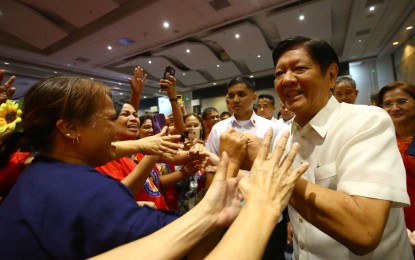
TOP SALESMAN. President Ferdinand R. Marcos Jr. is welcomed by overseas Filipino workers (OFWs) during the OFW Family Day celebration in Pasay City on Dec. 20, 2023. Marcos said his administration is committed to improving the lives of OFWs and providing support to their loved ones as evident in his continuous solicitation of investments during his official foreign trips. (PNA photo by Joan Bondoc)
MANILA – President Ferdinand R. Marcos Jr. capped 2023 with more focus on defending Philippine territory, attracting foreign investments, and making structural reforms.
Marcos’ decisive actions were highlighted by a stronger stance against China’s aggression and harassment in the Philippine waters and promoting priority sectors during his foreign trips.
In most of his engagements, especially at the Association of Southeast Asian Nations (ASEAN) and Asia-Pacific Economic Cooperation (APEC) leaders’ summits in California, United States, Marcos lamented the slow progress on negotiations for the final and binding Code of Conduct (COC) in the South China Sea (SCS).
During the Daniel Inouye Speaker Series at the Asia-Pacific Center for Security Studies in Honolulu, Hawaii in November this year, Marcos said he convinced his fellow ASEAN leaders to come up with another COC in the SCS to maintain peace in the disputed waters.
“We’ve taken the initiative to approach those other countries around ASEAN with whom we have existing territorial conflicts,” he said.
Marcos also had a pull-aside meeting with Chinese President Xi Jinping on the sidelines of the California APEC Summit, where they discussed fishing rights and other mechanisms to ease tensions between the Philippines and China in the SCS.
China, the Philippines, and several other littoral states have overlapping claims in the SCS, with Beijing claiming about 80 percent of the contested waters.
Despite the previous talks between Marcos and Xi, there are still reports of China’s provocative actions in SCS, particularly in the Philippines’ exclusive economic zone in the West Philippine Sea (WPS).
Marcos, in a statement issued on Dec. 10, emphasized that “no one but the Philippines has a legitimate right or legal basis to operate anywhere in the West Philippine Sea.”
“The illegal presence in our waters and dangerous actions against our citizens is an outright and blatant violation of international law and the rules-based international order.”
In a Dec. 16 interview with Japanese media in Tokyo, Marcos said a “paradigm shift” is needed to address China’s actions in the WPS, considering that the current diplomatic efforts between Manila and Beijing are heading in a “poor direction."
He, however, admitted that the Philippines needs to be careful and seek a “less confrontational method” to settle the maritime issues with China.
Investment pledges worth trillions of pesos
Apart from protecting and defending Philippine territory, Marcos is also focused on enticing more foreign investors to start or further expand their businesses in the Philippines, with a goal to spur economic growth in the country.
The President had a total of 12 overseas trips in nine countries (China, Switzerland, Japan, the United States, the United Kingdom, Indonesia, Malaysia, Singapore, and Saudi Arabia) this year.
The Philippines secured an estimated PHP2.484 trillion worth of investment pledges from those foreign travels, based on government data.
Despite the growing tensions between Manila and Beijing in the WPS, China remained the top source of foreign investments in the Philippines, with a total of PHP1.374 trillion.
This was followed by Japan (PHP721 billion in Feb. and PHP14.5 billion in December), Saudi Arabia (PHP234 billion), the US (PHP73.79 billion in April to May and PHP36.96 billion in November), Malaysia (PHP15.814 billion), Singapore (PHP11 billion), Switzerland (PHP1.3 billion), Indonesia (PHP1.221 billion), and UK (PHP1.05 billion).
Most of the companies that pledged to invest in the Philippines sought to pursue projects for the development of top priority sectors, including energy, infrastructure, technology, and health.
The investment commitments are expected to create more job opportunities for Filipinos.
Marcos also kept on reassuring the foreign business communities of his administration’s strong commitment to improve the business climate in the Philippines and make the country a top investment destination.
“With a solid reform agenda and unabating growth amid headwinds, the Philippines is ready to take off as a leading investment hub in Asia. A wealth of opportunity awaits you in the Philippines, and we are ready to explore new horizons with your investments in the coming years,” he told foreign business leaders and investors during the Philippine Economic Briefing in San Francisco, California in November.
Structural transformation
Marcos also repeatedly stressed that structural reforms are part of his administration’s economic policy-making and -planning.
He described 2023 as “the year of structural changes,” noting that the reforms are crucial in the country’s recovery from the economic challenges caused by the coronavirus disease 2019 (Covid-19) pandemic.
Marcos said the government is “remodeling” the fiscal, monetary and spending policies, as the country “moves away from the Covid economy.”
“Now, those structural changes should start to -- well, they already have but they will even have a greater effect in 2024 than they did in 2023,” he said in a recent interview in Japan.
“We’re moving in the right direction. But if you ask me, I always say it’s too slow, it’s too slow, it’s too slow. So, we will just keep pushing and pushing para matapos lahat ito (to finish all that we started) so that we can start to feel the effects of those changes that we made.” (PNA)
